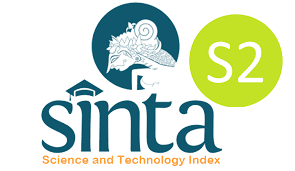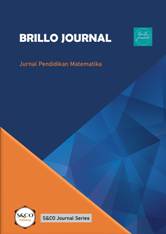Mathematical Communication Ability of High School Students in the Implementation of Experiental Learning Model
DOI:
https://doi.org/10.56773/bj.v3i1.43Keywords:
Experiential learning model, Mathematical communication skills, Linear equationAbstract
The objective of this research is to determine whether the enhancement in mathematical communication skills of students instructed with the experiential learning model surpasses that of students instructed with the conventional learning model. This research is a quasi-experimental research design, with the research sample comprising one experimental class (utilizing the experiential learning model) and one control class (following the conventional approach), each consisting of 20 students. The research instrument employed is a descriptive test comprising a pretest and posttest. Based on the research data analyzed using the N-Gain hypothesis test, it can be concluded that there is an improvement in students' mathematical communication skills in the context of the three-variable linear equation system material. This improvement is more pronounced among students taught using the experiential learning model compared to those instructed using the conventional learning model.
References
Ali, C. A. (2023). Exploration of the Ability of Preservice Mathematics Teachers Using Kolb's Experiential Learning Theory & Learning Styles. Indonesian Journal of Science and Mathematics Education, 6(1), 11-25.
Azizah, N., Usodo, B., & Saputro, D. R. S. (2020). The written mathematical communication ability of junior high school students in solving set problems. Journal of Physics: Conference Series, 1538(1), 012103. https://doi.org/10.1088/1742-6596/1538/1/012103
Dobos, Á. (2014). Experiential learning for professional development in the civil service. Procedia-Social and Behavioral Sciences, 116, 5085-5090. https://doi.org/10.1016/j.sbspro.2014.01.1078
Fauzi, A. (2021). Analisis kemampuan Komunikasi Matematis Siswa Pada Pembelajaran Daring. Undiksha Journal of Mathematics Education, 12(1), 32-41. https://doi.org/10.23887/jjpm.v12i1.33245
Heriyaman, H. (2022). Peningkatan Kemampuan Pemahaman Konsep Matematis dengan Pembelajaran Model Snowball Throwing Berbantuan Alat Peraga Pada Masa Pandemi Covid-19. Jurnal Edukasi Sebelas April, 6(1), 67-75.
Kleden, M. A., Geradus, U., & Sugi, Y. (2017). Meningkatkan kemampuan komunikasi matematis siswa smp melalui pembelajaran kontekstual berbasis budaya pesisir. Seminar Nasional Matematika dan Aplikasinya (pp. 151–159). Universitas Airlangga
Kolb, D. A. (2014). Experiential learning: Experience as the source of learning and development. Pearson Education.
Mutmainah, M., Rukayah, R., & Indriayu, M. (2019). Effectiveness of Experiential Learning-Based Teaching Material in Mathematics. International Journal of Evaluation and Research in Education (IJERE), 8(1), 57-63. https://doi.org/10.11591/ijere.v8i1.15903
Nursalma, A., & Pujiastuti, H. (2023). Pengaruh Waktu Belajar dan Motivasi Belajar terhadap Hasil Belajar Matematika. OMEGA: Jurnal Keilmuan Pendidikan Matematika, 2(3), 135-141. https://doi.org/10.47662/jkpm.v2i3.479
Rosalina, E., & Pertiwi, H. C. (2018). Pengaruh Model Pembelajaran SAVI (Somatis, Auditori, Visual, dan Intelektual) terhadap Kemampuan Komuniasi Matematika Siswa. Jurnal Pendidikan Matematika: Judika Education, 1(2), 71-82. https://doi.org/10.31539/judika.v1i2.313
Sapta, A. (2017). Pengaruh Model Pembelajaran Experiential Learningterhadap Komunikasi Matematis Siswa. Pythagoras: Jurnal Program Studi Pendidikan Matematika, 6(2), 94-99. https://doi.org/10.33373/pythagoras.v6i2.630
Sari, L. N. I. (2018). Peningkatan Kemampuan Komunikasi Matematis dan Motivasi Belajar Siswa dengan Menerapkan Model Pembelajaran Experiential Learning. Logaritma: Jurnal Ilmu-ilmu Pendidikan dan Sains, 6(01), 75-85. https://doi.org/10.24952/logaritma.v6i01.1246
Downloads
Published
How to Cite
Issue
Section
License
Copyright (c) 2023 Nina Ayu Triani, Ratu Mauladaniyati, Nenden Suciyati Sartika

This work is licensed under a Creative Commons Attribution 4.0 International License.
The authors agree that this article remains permanently open access under the terms of the Creative Commons Attribution 4.0 International License





